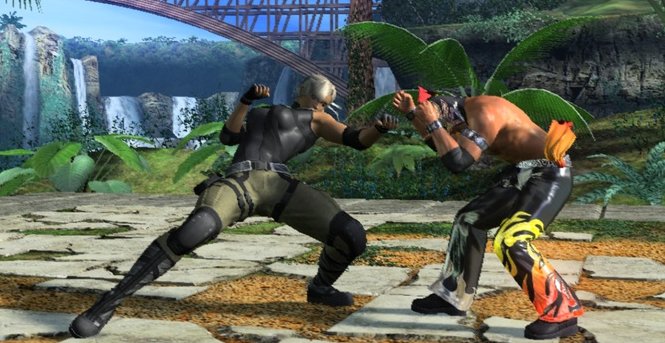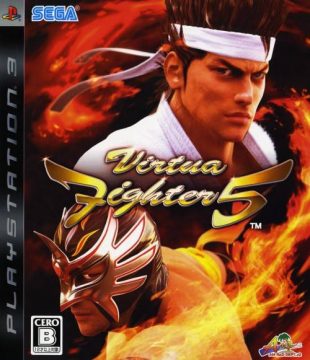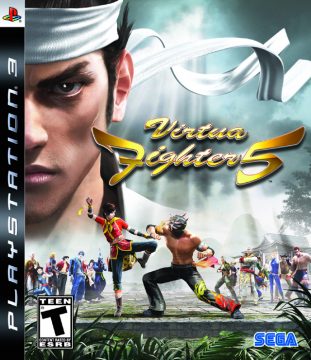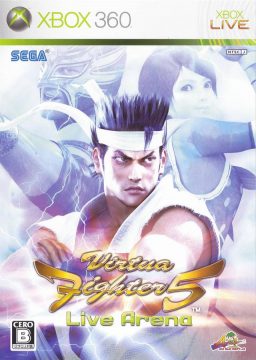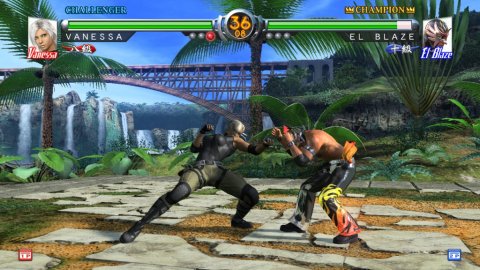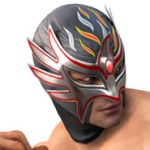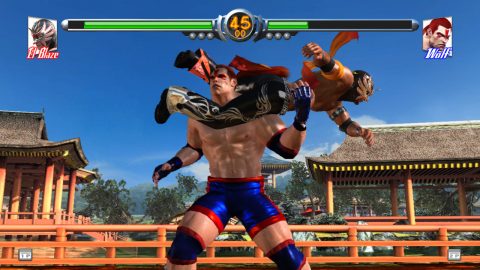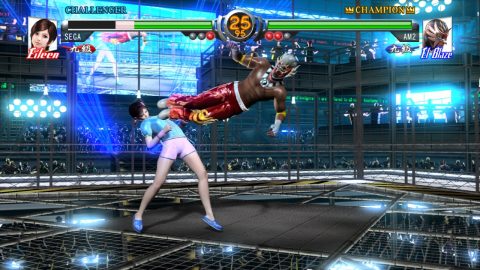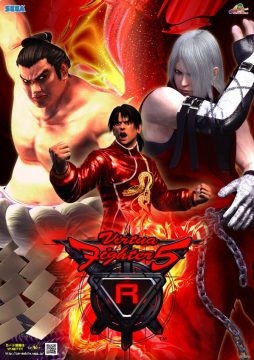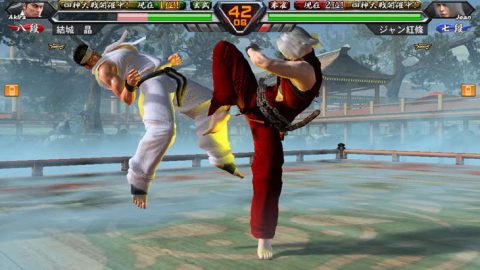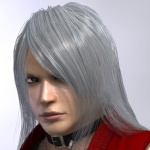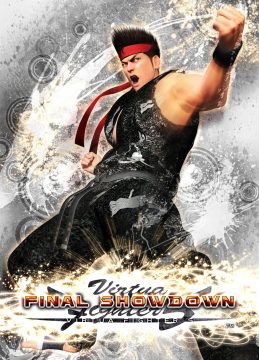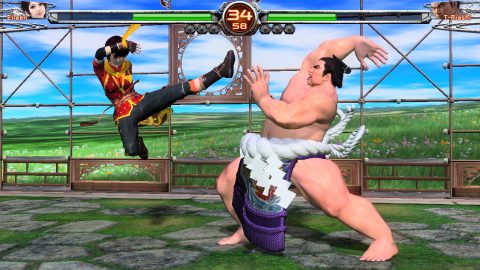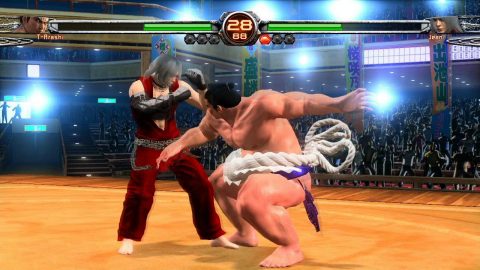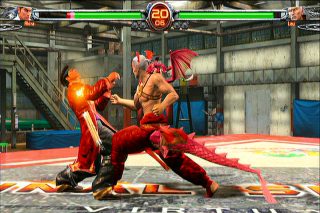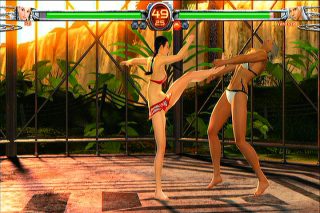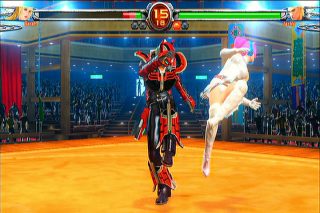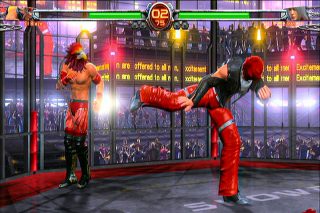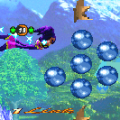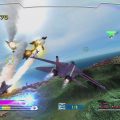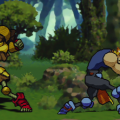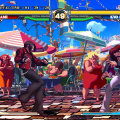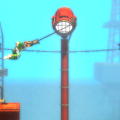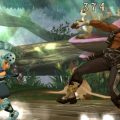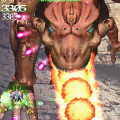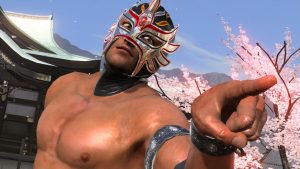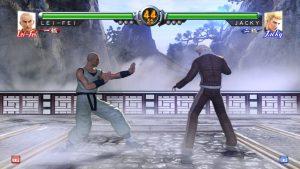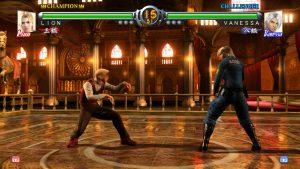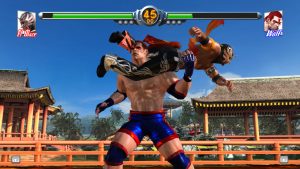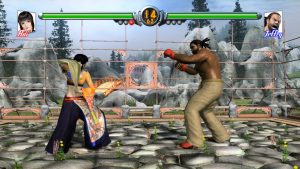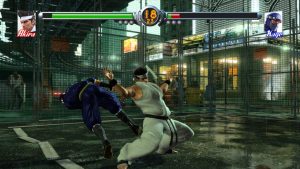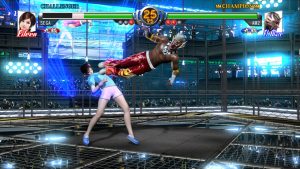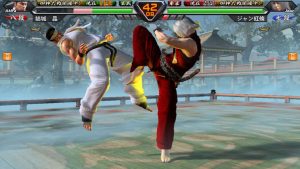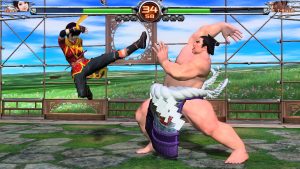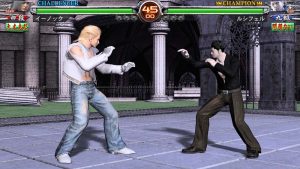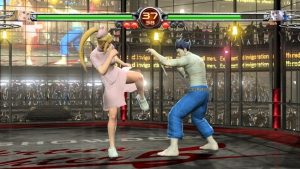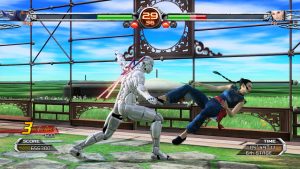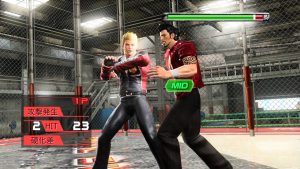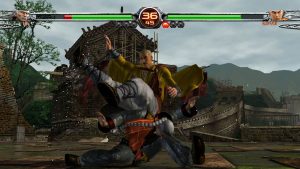Despite the long time in between releases, Virtua Fighter 5 doesn’t differ that much from its predecessor. Sure, it is built upon a new graphic engine, based on the new Lindbergh hardware, and it got the usual two new contestants for the World Fighting championship, but it might as well have been called “Super Virtua Fighter 4,” as far as the layman is concerned.
While every character has the usual load of new and modified moves and combos, and the timing of certain actions has been tweaked once more, there is only one fundamentally new mechanic: Offensive Moves. When pressing all three action buttons after a successful dodge, the character now makes a quick diagonal dash towards the opponent, providing a chance for a quick counter attack to the side or back. This allows for some even more rapid exchanges of blows, but doesn’t quite bring the wholly fresh “more 3D” experience Sega tried to promote the game on. Characters can also perform normal jumps again by pressing the block button together with an upwards direction, but these hops are of limited use, as they can only lead into an attack after landing back on the ground.
New Characters
Eileen
Eileen is a little monkey girl that does Monkey Kung Fu. She’s also a total fan girl for Pai. Like Lion, her small size can make her quite a frustrating opponent in the hands of an able player.
El Blaze
Compared to other fighting games, Virtua Fighter was never big on including characters from many exotic locales (one can count the number of combatants that are not from Japan, China or the US on one hand), so the swift and nimble Mexican luchador El Blaze was a fresh surprise. When Street Fighter IV revitalized Capcom’s fighting game effort two years later, it featured the tiny El Fuerte, who almost seems like a comedic take on the same character.
The main play mode in arcades is now Score Attack. Unlike the traditional arcade mode, this mode goes on just as long as the player manages to keep winning, and the final score can be submitted to VF.NET. When purchasing a Character Access Card, players now also receive an Orb Disc for their character. Every once in a while, a victory might reap an orb as a reward. Finding all seven Dragonba… erm, orbs makes the disc disappear and exchanges it for an accessory. In general the amount of costume parts has been increased a lot, and even though all clothes still belong into uniform sets, there are now four base costumes for every character.
It’s easy to see that the community portal has once again been a major focus, and Sega launched a whole infrastructure of supporting programs. So-called VF Terminals were installed in arcades, which were simply stationary VF.NET clients for players to manage their data, in case having access at home and on their cell phones wasn’t enough. Not far away, VF.TV sets can often be found, which broadcast promo videos, high-score lists or high-level competitions with live commentary. In addition to the known functions, Virtua Fighter 5 also made it possible to upload replays to VF.NET and later download them as video files.
After Virtua Fighter 5 was released, AM2 became more update-happy than ever, and within the same year, a Version B, Version C and Version D were released. The first one introduced the Knockout Trial, a single player mode that consisted of three selectable groups of opponents, who would then be fought in random order. Version C in turn brought a new VF.NET feature called Item Quest, which would simply reward players with an item if they managed to fight ten matches within a week after activating the quest. This revision also introduced the most “WTF?!” feature in a Virtua Fighter game ever: Bingo events! Version D replaced Knockout Trial with Knockout Trial 2, which for whatever reason was pirate-themed, of course including fitting costume options for the characters. The added accessories included weapons, which of course couldn’t be used in combat, but were worked into the character’s winning pose.
In early 2007 Virtua Fighter 5 arrived on PlayStation 3, based off the arcade Version B. Online gameplay was once again missing, but with the usual single player modes. VF Quest was mostly the same deal as in Virtua Fighter 4, only improved with some of the new VF.NET features and a hunt for “emblems” that would be displayed next to the player’s nickname. The excellent Dojo mode from Virtua Fighter 4 is also back. The start menu also contains a curious entry named VF.TV, which is simply the place to watch replays, some pre-packed matches and a bunch of promo videos.
The Xbox 360 version came about half a year late, but made up for it with the long-awaited online mode thanks to Xbox Live. The matchmaking is a bit barebones, and although you can turn down challengers it’s hard to get some decent matchups against opponents that are not either far too strong or far too weak, especially since there were never that many players around. But hey, it was finally something. It also included the added costumes from Version C – no pirates or weapons from Version D, unfortunately. The rest of the modes was the exact same as on PlayStation 3.
Virtua Figther 5 R, released in 2008, was essentially the equivalent to VF4 Evolution. Once again two characters with their own arenas were added, although one of them wasn’t entirely new: Apparently whatever difficulties AM2 had faced with realizing Taka-Arashi in the more recent games had been resolved, and thus the sumo ringer returned to the series. In fact quite a bit of work went into his appearance, as he got individual animations even when all the other characters shared them.
New Characters
Jean Kujo
The only truly new character in this revision is Jean Kujo. It seems AM2 decided to fill some of the gaps in terms of seemingly mandatory fighting game characters, so with one strike Virtua Fighter got its karateka and its stereotypical Japanese (or French-Japanese, to be precise) pretty boy. Like Goh, he officially works for the Evil Organization.
Virtua Fighter 5 R had a ridiculously long list of new features, although the new characters where the only addition that could gain a lot of interest in the West. One of the more noteworthy for Japan was the inclusion of a kind of raising simulation mode, where players could train and customize an AI “pupil,” much like in the PlayStation 2 version of Virtua Fighter 4. Knockout Trial got renewed once again, alongside more options for location events and the Orb Disc system was made more complex, now with three different sizes of marbles. And yes, more accessories.
Despite being the biggest update to Virtua Fighter 5 yet, R was never ported to any console. For a long time it seemed as if home players would never get to use Jean Kujo and Taka-Arashi. At least not until Virtua Fighter 5got updated once again in 2010 – five long years after the initial release, usually the time frame for an entirely new sequel. The update was nowhere near as big as R had been, and added only the usual tweaked balancing, new costume options, another Knockout Trial Special and… Twitter support! But it did rekindle hopes for new console ports. Granted, it still took two more years for the game to appear on Xbox Live Arcade and PlayStation Network.
As a low-priced download release, Final Showdown doesn’t feature any fancy Quest Mode, and the single player options are closer to the basic choice from the arcades. Arcade Mode replicates the standard string of opponents with the option to challenge Dural at the end. Score Attack incorporates elements of the Knockout Trials by offering the choice between three paths, although they’re not randomized.
Aside from the necessary practice in the Dojo, most time will probably be spent in License Challenge, since it’s the only solo mode that offers a decent amount of variety. The challenges in here range from the utterly pedestrian like “hit the opponent 5 times” or “win 6 matches in a row” to more interesting tasks like performing some of the more complex maneuvers or preventing the opponent from getting in too many parries. The most fun challenges, however, are the ones that mess with the fighting mechanics. How about a super-fast match, were the recovery times for all attacks are eliminated? Or fighting in reduced gravity for some insane juggles? Of course, these are more gags than serious alternatives to the standard gameplay, but for the duration of a single challenge, they’re definitely worth trying out.
Finally, there is Special Sparring, which is just a fight against costumed versions of the fighters. This one, however, requires the item packs for all characters, and this is where Final Showdowns appears like a cynical cash-in for a moment: There is no way whatsoever to unlock any costumes or accessories through playing the game, at ludicrous prices: The cheapest way to get all the outfits are two bundles, each of which cost as much as the game itself. The first Xbox 360 version of Virtua Fighter 5 had some overpriced DLC costumes, too, but at least there were enough options to play with before you had to pull out your wallet. When getting over the first shock, the complete package is still below standard retail price, so overall it’s actually not that bad of a deal, but paying more than twenty bucks for costume options is a bit hard to stomach after getting the game itself for half as much.
With the proliferation of smart phone apps, Western users also finally get to enjoy some unnecessary supplementary material with the Virtua Fighter 5 Final Showdown Guide on iTunes, which contains character bios, move lists and combo tutorials.
While it certainly doesn’t go out and invent the wheel anew, Virtua Fighter 5 through all its revisions has achieved near perfection at what it’s doing, but that’s exactly what may be the demise of the series. Could a lack of further directions be the reason there is still no announcement for a Virtua Fighter 6 in sight, after seven years of updates? AM2’s continued focus on the arcade scene might also factor into this. At any rate, Virtua Fighter seems to be in need of some major fresh impulses before it can continue in any meaningful way in the once again crowded fighting game market.
Even in Japan, Virtua Fighter 5 never managed to get back ahead of the Tekken series after a weak start in arcades. Especially starting the social functions from scratch after Virtua Fighter 4, with many beloved features originally unavailable or locked behind a premium barrier, turned much of the established community sour on the franchise. Yet Sega kept up the support through the years, releasing more tweaks and revisions, and holding official tournaments and other events.
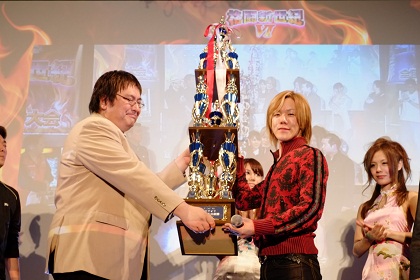
Daichi Katagari congratulating Chibita to his victory in Kakutou Shinseiki VI, Sega’s National Virtua Fighter 5 Tournament in March 2012
Final Showdown Costumes
